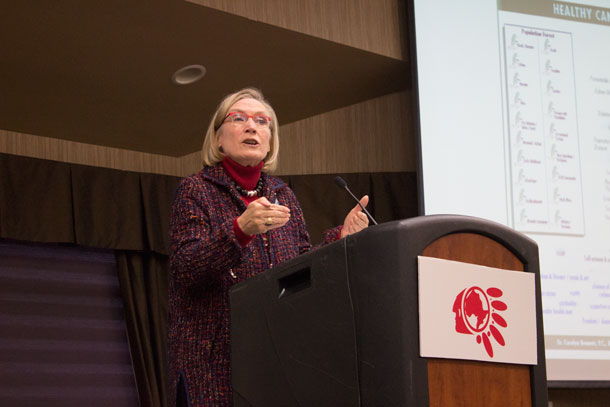OTTAWA – GOVERNMENT – The Auditor General’s Report on Nutrition North shows that there are serious issues in the Aboriginal Affairs and Northern Development Canada management of the Nutrition North program.
“Our audit objective was to determine whether Aboriginal Affairs and Northern Development Canada has managed the Nutrition North Canada program:
- to meet its objective of making healthy foods more accessible and affordable to residents of isolated northern communities, and
- to obtain the information required to allow it to demonstrate that the full subsidy is being passed on to consumers.
What we found

Identifying eligibility
Overall, we found that although Aboriginal Affairs and Northern Development Canada has consulted with Health Canada to base food eligibility under the Nutrition North Canada (NNC) program on nutritional value, Aboriginal Affairs and Northern Development Canada has not identified eligible communities on the basis of need. This finding is important because it is essential that subsidized foods be healthy and that communities in need benefit from the subsidy.
- Aboriginal Affairs and Northern Development Canada consulted with Health Canada to base food eligibility on nutritional value (see paragraphs 6.13-6.16)
- The Department has not based community eligibility on need(see paragraphs 6.17-6.21)Recommendation. Aboriginal Affairs and Northern Development Canada should review its community eligibility criteria for the Nutrition North Canada program to base the criteria on need, and it should assess the eligibility of communities accordingly.”

Passing on the subsidy to consumers
Overall, we found that Aboriginal Affairs and Northern Development Canada has not verified whether the northern retailers pass on the full subsidy to consumers. The Department has not required the information it needs to verify this in the contribution agreements it has signed with northern retailers. It also has not required that compliance reviews of northern retailers include analysis of profit margins in order to verify that the full subsidy is being passed on. This finding is important, because passing on the full subsidy to consumers is a program requirement, and is necessary to make nutritious food more accessible and affordable to Northerners.
- The Department has not verified whether northern retailers passed on the full subsidy to consumers (see paragraphs 6.23-6.37)Recommendation. Aboriginal Affairs and Northern Development Canada should review the obligations and requirements in contribution agreements under the Nutrition North Canada program to clarify that retailers must provide all the information on eligible items, including current profit margins and profit margins over time to determine whether the retailers are passing the full subsidy on to consumers.
Recommendation. Aboriginal Affairs and Northern Development Canada should
- clarify the requirements for conducting compliance reviews by specifying that the work to determine whether the full subsidy is being fully passed on to consumers must include an examination of current profit margins and profit margins over time;
- assess the compliance reviews to determine that appropriate review work was completed and that the conclusions in the reports are clear and well supported; and
- in cases where compliance reviews make recommendations to retailers, formally monitor the implementation of the recommendations.
Managing the Program
Overall, we found that Aboriginal Affairs and Northern Development Canada has not fully implemented a performance measurement strategy or followed its cost containment strategy to help manage the Nutrition North Canada (NNC) program. This finding is important because a performance measurement strategy provides the Department with the information it needs to manage the Program and monitor whether the Program’s objectives are being met. A cost containment strategy allows the Department to manage within its budget. Both strategies were specified in the Program design, and were required for program approval.
- The Department has not collected information needed to manage the Nutrition North Canada program or measure its success (see paragraphs 6.39-6.49)Recommendation. Aboriginal Affairs and Northern Development Canada should review and update its performance measurement strategy. The strategy should ensure that performance indicators allow the Department to manage the Nutrition North Canada program to meet its objective, collect data to report against the indicators, and clearly specify responsibilities for data analysis and reporting.
- The Department has not implemented the Program’s cost containment strategy(see paragraphs 6.50-6.55)Recommendation. Aboriginal Affairs and Northern Development Canada should consider all options in implementing its cost containment strategy.

Aboriginal Affairs Accepts the Audit Findings
Bernard Valcourt, Minister of Aboriginal Affairs and Northern Development, issued the following statement in response to “Chapter 6, Nutrition North Canada” in the 2014 Fall Report of the Office of the Auditor General:
This program is proving that it is helping to meet the needs of Northerners and the results are clear. Data collected from registered retailers and suppliers show that the program is having a positive impact in communities, where, since its implementation, the volume of perishable nutritious food shipped to northern communities has increased by approximately 25 percent, and the cost of a food basket for a family of four dropped by approximately $110 a month in the first two years of the program.
To build on this progress, Economic Action Plan 2014 committed to enhance funding for the NNC program to help improve access to healthy foods for the 103 communities it serves. As announced on November 21, 2014, this year and next, our Government will invest $133.7 million in direct subsidies for healthy, perishable foods for Northerners. As opposed to the previous Food Mail program, the Nutrition North Canada program is dynamic and is intended to continue improving.
Our Government welcomes the report issued by the office of the Auditor General (OAG). We accept the five recommendations in the Chapter on Nutrition North Canada. In fact, various initiatives, including the addition of a new clause in the funding agreements that will ensure recipients provide all the information on eligible items, including profit margins and profit margins over time are already under way.
In the coming months, our Government will also be engaging with Northerners, retailers and suppliers on ideas to keep improving the program for Northerners.
We remain committed to providing Northerners with access to perishable nutritious food.”





